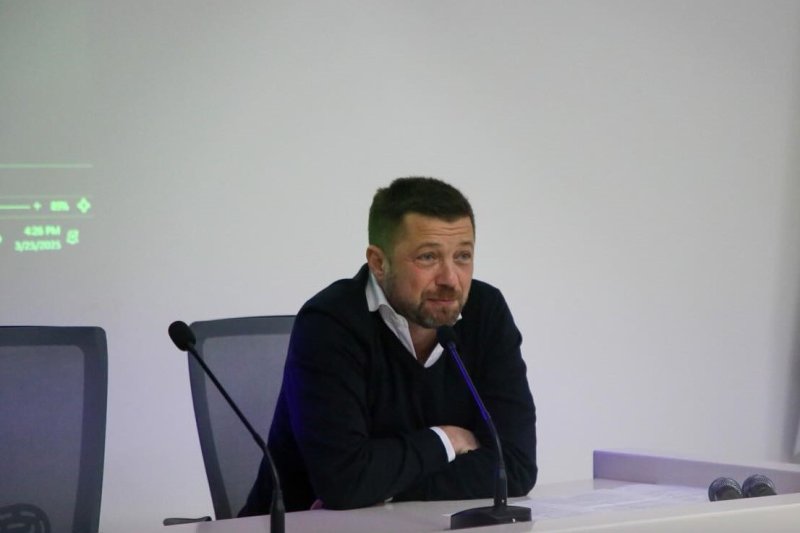Youth and Culture Are Capital...
Youth exodus is the emergency of Western Balkans. New generations, creative industries, artists, filmmakers of the Region are a fundamental resource for social integration, peaceful development, long-term sustainability and conflict prevention. Albanian Daily News has deepened the topic with Ernesto Spinelli, founder of the start-up Wild Creative Industry, in this exclusive interview.
-Mr. Ernesto, in a recent op-ed, ‘Tech-Humanism may be the way’, you’ve gone through Artificial Intelligence, its potential for European culture and creative industries, and the risks of an opiate effect on new generations. Let’s start from the insight Tech-Humanism. How is it linked to the present situation?
- Youth and culture are capital infrastructures of societies. You may have everything, cities, banks, enterprises, public services, highways, railroads, airports, skyscrapers, protected areas, museums, but without new generations - can you imagine? – the risk is you just have unproductive stones. The same can be said on Artificial Intelligence and the fast development of new technologies and software for production and post-production in entertainment, art and communication. Without social dynamism and permanent international exchanges among new generations, if the cultural environment is passive or unattractive both for citizens and travelers, you just have rusty algorithms, a boring sequence of one and zero. With the concept Tech-Humanism I refer to the new worldwide artistic and creative outcomes coming from the best use of those new software. At the same time, I refer to the contents. As far as technology goes, more human contents are requested to boost appeal and interest for citizens and travelers, with the goals, on one side, to raise the level of attention and attractiveness of a cultural environment, on the other side, to exorcise an opiate effect on new generations. Western Balkans youth has stories to tell and share. They are open ways towards integration and active co-existence.
-Even if I may seem too old and skeptical, it takes investments. Doesn’t it?
- It does, indeed. It takes also – above all - a watershed vision, a precise perspective: how do you see the cultural environment in the Western Balkans two years from now? Following this question, it’s important professional commitment and investments, both public and private, are linked to wise competitive, qualitative and not quantitative indicators to be monitored. Art life precedes art finance. From this point of view, financial indicators – especially in growing countries - are not enough, at this time. How many high qualified professionals are working in the Region: this is an essential qualitative indicator. Ideas and original contents are first. Youth and culture should be preserved from a commercial or financial radicalism, through a clear mark of trust. The concept Tech-Humanism is just a formula: use new technologies to tell human stories, delivering on the market high quality entertainment and art productions, aware that competitiveness is first on ideas and messages, only second on the fireworks of technologies and big money.
- I agree with you, but let’s look closely at it. You spoke about qualitative indicators. The present scenario in Albania sees irregular citizens rejected from Europe, pensioners and little spenders coming here for holidays, while thousands of Western Balkans high qualified 20s and 30s emigrates escaping from disillusion and lack of opportunities. Can you get more into this topic?
- Youth exodus is the emergency of Western Balkans, indeed. Youth and culture are capital. It means they are life. It’s a matter of past or future. It’s there for all to see or, in the worst case, not to see. There’ll be no future in empty functional buildings, courts, enterprises, protected areas or universities. If you lose youth and culture, what remains is a boring sequence of one and zero. As said, ideas, new productions and opportunities are a natural, sustainable fuel. Of course, I’m referring to the field of culture and communication, but it’s generally true. If you fertilize other soils, yours won’t bear fruit. Disillusion is understandable. The commitment of the start-up Wild Creative Industry is a little attempt to contribute to a concrete change.
-In the framework of the photography and new images contest Artificial Intelligence vs Human Intelligence, launched by the Italian Institute of Culture in collaboration with Wild Creative Industry, you have met tens of Albanian students. What’s your impression?
- I met the students of the University of Arts and the University of New York in Tirana. The majority were women. I felt lucky. Albanian youths have a sad silence and a happy thinking. It took few respectful, authentic questions and they showed strong inner life and ideas. The contest deadline is 3 May 2025, so I can’t say much more.
- What could you say about the possibilities of cooperation of youth of regional countries, especially on the topics we discussed above?
- As far as I could find in the first months of activities of the start-up, Western Balkans region is looked with interest. The point is this: cheap production conditions are not enough. To compete on the international market, you need high quality services and professionals. Excuses zero. Western Balkans and Albania would benefit from more cultural and entertainment infrastructures and production facilities, such as cinematographic studios, only to mention an example, and well-trained reliable professionals that are proud to work in the region. For youth and sustainability, it’s also important to enter permanently into international circuits. There have been high quality cases of Albanian and Balkans productions in the recent past, above all in cinema, but not only. A regional collaborative and united network of creatives and artists, Festivals of Creativity, Art, Cinema, Music, Theatre, stable co-productions, etcetera, are important initiatives hopefully will be increased and promoted in the near future. The bridge international market - Western Balkans could and should be a two ways bridge. In a wider perspective, there are ongoing experiences such as the EU-Balkan Youth Forum. But, for growth and sustainability, new generations should be supported and freed from political pressures.
- ?Let me touch the topic in a broader perspective. How much could youth contribute to the accession process of the Western Balkan countries to the EU and on the other hand how Brussels sees the potential of youth of WB countries to contribute to the integrated Europe, especially at the tense times when winds of war blow?
- I can’t say how Brussels sees the region’s youth. For sure, the international community knows very well the regional scenario. The problem, I guess, it’s not how Brussels sees the region’s youngs, the problem is how it sees the elders. Culture and youth are antidotes to decline and war. No doubt. Look at a dreadful indicator: all the main present aggressive or war leaders are old, very old in same cases. War is an old, tragic indicator of power. If allowed, Balkan youth can play a major role in a new narrative and peaceful sustainability of the upcoming European Western Balkans. Look at what’s happening in Serbia, as an example. Everyone in Western Balkans has to do his part in a broader perspective, both public and private sectors, no matter how big or little it may be. You can’t sustainably develop emptiness, chaos or an unstable and everyday aging Region. Youth and culture may turn to be a main driver of change.














